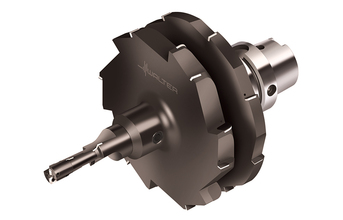
The carbide indexable inserts are used for roughing work to and achieve an extremely high machining volume. Their special tool geometry also produces short chips even when machining aluminium, thus solving the problem of chip removal.
In the following machining step, the hybrid tool's PCD indexable insert can be used for finishing. "The user therefore employs one and the same tool for two completely different machining stages. This reduces non-productive time as there is no need to change the tool."
According to Hanischdörfer, the PCD indexable inserts used to carry out finishing operations ensure an extremely high surface quality. Recently, Walter has also started offering PCD tools with chip breakers lasered into the diamond cutting edge. "These reduce metre-long chips to a few centimetres.
Many Walter hybrid tools can also be configured for use with minimum quantity lubrication (MQL). Instead of emulsion or oil, as is the case with conventional wet machining, an oil-air mixture cools and lubricates the machining surface and tool. This has several advantages. Firstly, using MQL brings the amount of coolant required per hour from around 500 litres down to only 10 to 20 ml. Secondly, using MQL does away with the expensive and environmentally harmful need to dispose of coolant and wet chips as special waste.
Complete machining concepts
Walter engineers have demonstrably achieved high tool life and cutting data for their hybrid tools in practical use. "Customers who are using these tools and can see the results in their workpieces, including cutting data and tool life, are absolutely delighted," Roland Hanischdörfer is pleased to report. Moreover, customers are increasingly commissioning Walter to develop machining concepts based on these. "Our customers need solutions to improve their efficiency, but they do not want to have to put a lot of work into their development. We have been seeing this trend for many years now. We are therefore deploying our skills in metal machining not only to develop highly efficient tools, but also to offer our customers complete machining concepts."
There are usually two routes to this type of concept:
- The automotive customer invites the Walter experts to their own premises and shows them computer images and/ or prototypes of the new component. Walter develops the complete machining concept based on these, including all tools.
- The user goes to their machinery manufacturer and purchases the complete machining process from them. The machinery manufacturer contacts Walter in order to define and purchase the tools required for this. Or the manufacturer develops the machining concept in collaboration with Walter.
No matter which route leads to the destination, the basis is always as detailed as possible knowledge of the existing machining processes and framework conditions at the customer's premises.
More and more users are also requiring an even more extensive service from Walter: The development of complete component cost concepts. The key point here is that the Tübingen firm can guarantee specific costs per component. This is a significant advantage in the automotive sector in particular, where the "Cost Per Part" (CPP) is the key calculation variable.
This requires extremely close collaboration between Walter and the respective user, however, as well as the extensive digitalisation and networking of all production processes. Roland Hanischdörfer explains: "If our digital manufacturing experts have sufficient data to make the processes transparent in detail, they can unlock previously unimaginable optimisation potential and achieve amazing efficiency gains."
END



























